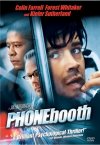BUY THE DVD:
|


|
|
|
SYNOPSIS:
| |
stuart shepard finds himself trapped in a phone booth, pinned down by an extortionist's sniper rifle.
|
|
|
MOVIE FACT:
| |
had its united states release date pushed back due to the sniper killings in 2002 on the east coast.
|
|
|
RATING:
|


two out of four possible stars
|
|
|
|
Phone Booth is a film which has traveled the gamut of Hollywood run-arounds, sitting on the desks of more than one director and on several different stars. Director Joel Schumacher came to this project after Michael Bay departed it and Colin Farrell was about the fifth actor to attach his name to the lead role. But though the idea for this film had been floating around since at least 1998, the necessary elements for an exciting thriller seem to have fallen into place with Schumacher's direction and Farrell's performance.
Since approximately eighty-five percent of the film takes place inside or immediately outside a phone booth on a street in New York City, this film is probably as close to a stage play as you can get without actually performing it on the stage. It also takes place (most of it) in real-time, meaning the events unfold without edit jumps to compress time. The film's format and lack of varied locations represents the taking of quite a chance by Schumacher and 20th Century Fox, the distributor of the film, since mainstream audiences usually expect a different approach to feature films.
But given the size of the "room" in which the film takes place (a busy city street in New York City), the fact that most of the film occurs in one spot doesn't seem as restricting as it might have had it taken place in a smaller town or inside a room rather than outside. But in watching this film, audiences should be prepared for a pace that takes off at a run and keeps on pumping until the last frame of the film. Perhaps the editor was able to keep the pace at such a haul because he didn't have as long a running time to fill as feature film editors are usually given.
Clocking in at less than seventy-five minutes (without the credits), Phone Booth concludes before some movies have even passed into their final act. It's easy to complain that viewing such a short film makes the price of a ticket a little steep, but Schumacher and his crew make their minutes count. In a strange mix of character development and plot twists, the filmmakers have tried to put forward a message for the audience to appreciate, but when all is said and done, this film works much better as a quickly paced thriller than a serious commentary on modern civilization.
Owing to a powerful performance from Farrell, the main character of Phone Booth is a sympathetic character over the course of the entire film, despite that character's less than squeaky clean job as a publicist. As someone who lies for a living, "Stu Shepard," Farrell's character, dances a thin line between morality and getting people what they want. He's willing to bend the rules to the breaking point in order to further his own reputation and those of his clients. And when an unknown assailant decides that Shepard must answer for his "crime," Shepard is trapped between the guns of a legion of police who suspect he shot a pimp and the bullet of a very twisted sniper.
It is safe to say that had this film extended much beyond its tidy running time, the film might not have been so adept at creating a lasting suspense for the audience. Just moments after his exit from the phone booth (don't worry, I won't spoil it by telling you if he lives or dies), the credits start to roll. The character development between Shepard, his wife "Kelly" (played by Radha Mitchell), and the woman Shepard wants to make his mistress, a waitress named "Pamela" (played by Katie Holmes), is a love triangle that's been seen on the screen just a few times before.
But with the morality drama that comes into play because of the sniper's effort at extortion, the relationship between those characters is put to the test in an interesting way. Utilizing all the aspects of modern convenience (television, cellular phones, semi-automatic assault rifles, etc.), the filmmakers try to make a comment on the existence of each of those elements. Whether that comment is a successful one, or something on which the audience will pick up, is debatable. For this film seems to be much more effective as a thriller than a film whose primary purpose is to teach the audience something.
But the film passes by so fast and takes a stab at a subject already tread upon by filmmakers in more than one film, so praising this film for its conscience is possible, but not a certainty. While some viewers might appreciate the thought put into the theme of the film, most audience members will probably receive more satisfaction from the visceral pieces of the narrative rather than its educational aspects. In other words, this film is a very entertaining one whether one takes into account the "lesson learned" or not. But the added bonus of Schumacher and crew's "comment" on modern society can probably be seen as a welcome element to those viewers who like to receive more from a film than simply good visuals.
Review by Kelsey Wyatt.
| |
|